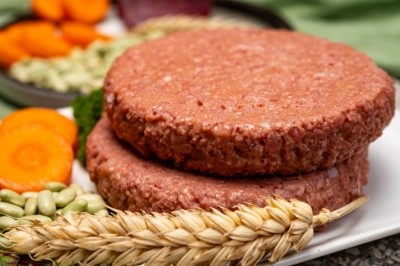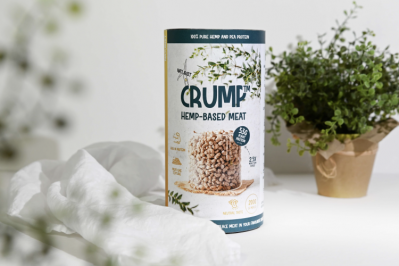The tech behind ‘single-ingredient’ smoked salmon analogue revealed: ‘Our spirulina can act as a complete replacement for animal-based protein’

Israeli foodtech start-up SimpliiGood by Algaecore Technologies has developed the first commercial smoked salmon analogue made from a ‘single ingredient’: whole fresh spirulina.
The company worked alongside international ingredients conglomerate IFF to develop a product that mimics the appearance, colour, texture and flavour of smoked salmon. A strategic cooperation agreement was reached between the Israeli Innovation Authority, SimpliiGood and FoodNxt, the innovation lab established by IFF. This arrangement sees SimpliiGood provide the raw material, texture and colour properties while IFF contributes flavour and aroma components.
“The product is made 95% out of pure, fresh spirulina, including color and texture. We just add a touch of flavour and oil,” chief executive and co-founder Lior Shalev revealed.
The new salmon analogue, the company’s first foray into the alternative fish space, is expected to hit the market by the end of 2023. It will join a series of existing spirulina based SimpliiGood branded products marketed in Israel to food producers and directly to consumers. The company’s current portfolio encompasses a range of meat substitutes, including hamburgers and chicken nuggets, as well as popsicles, ice cream, crackers, and beverages where spirulina serves either as the base ingredient or as nutritional enrichment.
“Our spirulina can act as a complete replacement for animal-based protein or be easily integrated into existing food products as an added-value ingredient, as it has a neutral flavour and maintains its full nutritional value,” Shalev noted.
SimpliiGood intends to market the fish analogue under private label or in partnership with larger food manufacturers and the company aims to broaden its offering to include additional fish analogues in due course.
“We expect the category of alternative fish to be the main growth engine of the company for the years to come. We intend to expand our sales mainly in Europe and the US markets which are ripe for this clean, marine, plant-based product,” he told FoodNavigator.
So, what technological developments and ingredient innovation have enabled SimpliiGood to develop its clean label salmon analogue?
It starts with the spirulina...
SimpliiGood specializes in cultivating and harvesting fresh blue-green algae.
SimpliiGood cultivates its spirulina in a system of 90m3 capacity ponds housed in greenhouses situated in the southern desert region of Israel. 98% of the water used in the process is recycled. The company produces 50 tons of spirulina per year, with a harvest every 24 hours, making it what the company describes as ‘a highly commercially viable plant-based protein source’.
Working with spirulina offers a number of nutritional and functional benefits, we were told. It is a nutrient-dense plant-based protein that contains antioxidants, chlorophyll, vitamins, (including B12), and minerals such iron. SimpliiGood cultivates and markets a specific strain of 100% raw fresh spirulina that boasts 90% bioavailability.
“Essentially, we grow fish in the desert without actually growing fish, thus avoiding bio-accumulation of micro-plastic, heavy metals, hormones antibiotics and other environmental pollutants,” the food tech entrepreneur said. “It contains 40% complete protein, more protein that you can find in fish. We will need to compensate in the fatty acid department, which is a common issue with other alternatives, whether they are plant-based or cultured in a bioreactor.”
...Which is transformed through proprietary processes
But how does the company take an ingredient that essentially resembles green sludge in its unprocessed state and turn it into something akin to smoked salmon, or indeed any other meat analogue?
“Our proprietary process starts with the green removal of chlorophyll, followed by an enzymatically assisted, highly controlled colour adjustment based on native content of carotenoids and zeaxanthin within the biomass. This phase enables the creation of virtually any type of animal-like tissue colour out of the decolorized spirulina cell platform,” Shalev revealed.
“Secondly, the cells are transformed into fibrous structures using a natural plant based scaffolding system, which once gently compressed becomes very similar to an actual fish tissue,” he continued.
“With a few tweaks in the flavor and texture we can mimic virtually any type of fish and animal tissue, creating the same user interface while elevating protein content twofold, preventing consumption of pollutants and antinutrients, protecting the marine and coastal environment and increasing supply chain stability and resilience.”
The end product is a clean, green meat alternative and Shalev speaks enthusiastically about the environmental credentials of SimpliiGood’s approach. “The spirulina SimpliiGood cultivates is one of the most efficient converters of sun energy into protein. Spirulina requires salt, minerals, heat, CO2, and water to thrive. The process of growing spirulina actually captures carbon and uses it to grow. The strain that the animal food industry places on the environment and food security has elevated the need to develop sustainable protein substitutes.
“We are excited to collaborate with these leading global food industry players to bring a tasty and highly nutritious product to consumers worldwide, without harming animals or the planet.”

































